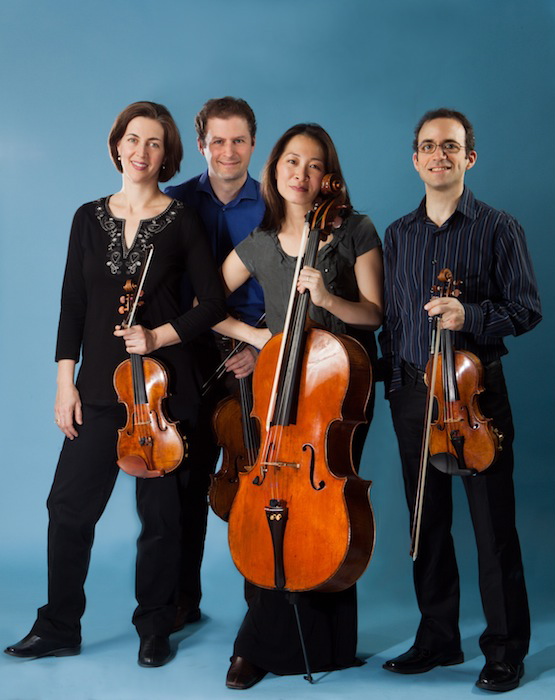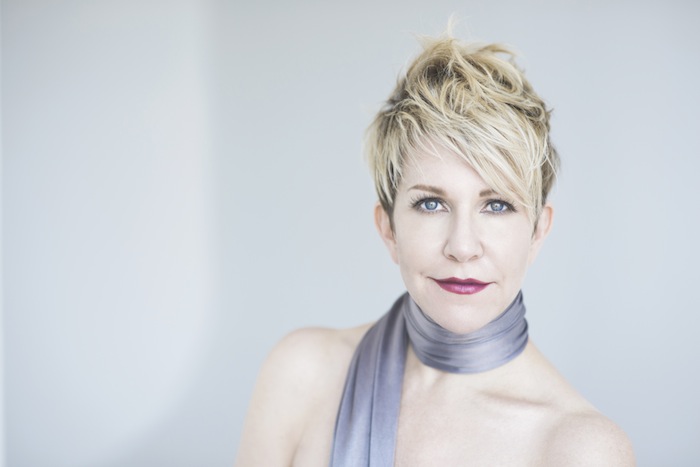Brentano Quartet and DiDonato team up in Strauss and Heggie

The Brentano String Quartet opened the Fortas Chamber Music Series Wednesday night. Photo: Christian Steiner
Joyce DiDonato has not visited Washington since 2011, when the American mezzo-soprano feted the 20th anniversary of Vocal Arts D.C. On Wednesday night she opened the season of the Fortas Chamber Music Concerts series at the Kennedy Center. Her performance, though delightful in many ways, was overshadowed by the group that shared the stage with her, the Brentano String Quartet.
Formed at Juilliard and in the current formation since 1998, the Brentano has made the rounds of the city’s chamber music venues over the past decade. They have a refined, balanced sound that urges, even requires the listener to lean in and pay attention.
They opened with four of the Contrapunctus movements from Bach’s Art of the Fugue, which underscored the intimate nature of the sound the group creates together. Restricting their use of vibrato, the four musicians carefully wove together the strands of Bach’s counterpoint, delineating the overlapping subjects and responses in a way that never sounded pedantic.
The group took Contrapunctus VII at a faster tempo, so that the augmented version of the subject, in long notes, could still be understood as a melody, with the simultaneous versions of the tune in smaller note values whizzing by. Bach transformed the subject into a series of sighing motifs in Contrapunctus XI, which first violinist Mark Steinberg, and the other three players rendered in a light, acutely balanced way.
When a string quartet plays Haydn well, many of the other elements of good musicianship fall easily into place. The middle movements especially of the composer’s first essay in the genre, the Quartet in E-flat major, Op. 20, had just the right natural ease. The easy-paced minuet was given pleasing ornamentation on its repeat, and the tender declaration of the slow movement opened as a mere whisper of sound. The first movement, also charmingly ornamented when the main themes were repeated at the exposition, was disrupted by a tempo that felt a notch or two too fast. The same frenetic quality suited the finale (“Presto”) much better.

Joyce DiDonato. Photo: Simon Pauly
DiDonato sang a set of five Lieder by Richard Strauss, in arrangements for string quartet by Brentano violinist Michael Steinberg and violist Misha Amory. The tessitura of the quiet, plaintive “Ach Lieb, ich muss nun scheiden” sat most easily for DiDonato, and the Brentano Quartet proved themselves excellent accompanists, molding their sound to DiDonato’s voice.
She unfurled a brilliant sound in “Du meines Herzens Krönelein” and “Traum durch die Dämmerung,” wrapping the tone in warmth and clean diction. At the top notes more than once turned brittle, with intonation suffering, especially in “Die Nacht.” DiDonato returned to Strauss for a single encore at the end of the recital, a reverent reading of the song “Morgen.”
American composer Jake Heggie composed his song cycle Camille Claudel: Into the Fire for DiDonato in 2011 (she recorded it with the Alexander String Quartet for the Pentatone label in 2013). Gene Scheer, one of Heggie’s regular librettists, provided the texts, drawn from the life of sculptor Camille Claudel. A brilliant student, and lover, of Auguste Rodin, she speaks in these poems to six of her sculptures on the day that she is to be committed to a mental asylum. In the last song she is visited by a friend there many years later.
Heggie’s vocal writing suited DiDonato better than most of the Strauss set. The fourth song, “La Petite Châtelaine,” was particularly lovely, with muted strings and a contained, rarefied sound from DiDonato. Heggie is not really known for chamber music, and he reverted to simple textures for the instruments, the first violin too often doubling the voice. DiDonato sang with an obvious love and respect for this music. Only the climactic high note of the “Epilogue” had the same wayward tuning noted at some points in the Strauss set.
While the Kennedy Center renovates the Terrace Theater, the Fortas series is relocating its concerts to other venues. The Family Theater worked beautifully for a concert of this type, with one exception. As noted at Janai Brugger’s recital last month, a persistent buzzing sound distracts, either from one of the lights or the ventilation system. While not loud enough to disturb the music most of the time, in quiet moments and silences, it is an annoyance that should be remedied.
The Fortas Chamber Music Concerts series presents a jazz-centered program with the Harlem String Quartet and Cuban composer-pianist Aldo López-Gavilán 7:30 p.m. October 17. http://www.kennedy-center.org/calendar/event/MRFSB
